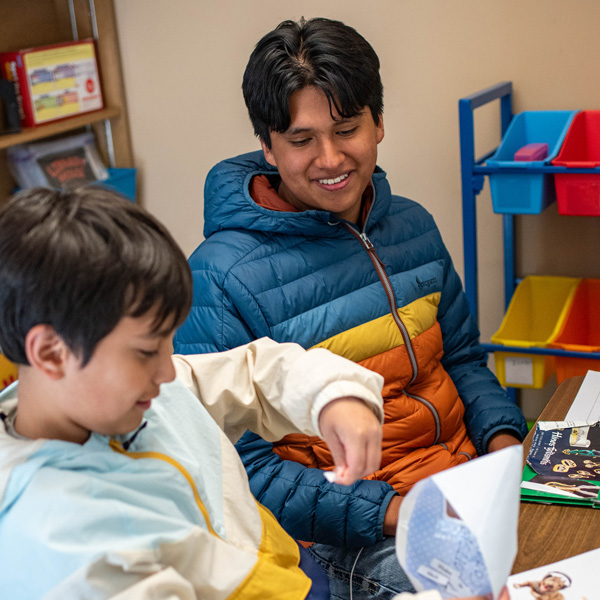GRADE 10
This year, you will continue to look at different career paths, majors and colleges. You will also begin preparing for standardized tests by taking the Practice ACT and/or PSAT exams and accessing the many ACT Prep resources available (many for free). You will continue to explore financial aid options. Donʻt forget to continue being involved in your community, perhaps with an internship, and maintaining your grades.
GRADE 10
This year, you will continue to look at different career paths, majors and colleges. You will also begin preparing for standardized tests by taking the Practice ACT and/or PSAT exams and accessing the many ACT Prep resources available (many for free). You will continue to explore financial aid options. Donʻt forget to continue being involved in your community, perhaps with an internship, and maintaining your grades.
10th GRADE ROADMAP
Challenge Yourself
Take as many challenging classes as you are capable of, considering your time constraints, academic ability, and other life stressors (a balanced life is important).

Sign Up for PSAT
In last couple of weeks of September (and into early October), sign up to take the PSAT/NMSQT® or PSAT™ 10. These tests provides valuable feedback on your college readiness and a free, personalized plan to help you start getting ready for the SAT — and for college.
If paying for the PSAT - or future SAT or ACT tests - is a barrier to you taking it, please talk to your school counselor. You may be eligible for a fee waiver.
Visualize Life After School
Start thinking about your life after school, including the types of jobs that might interest you. Of course, these will change — often — but it’s good to start thinking about the possibilities.
- Research majors that might be a good fit with your interests and goals based on your results from the You Science assessment in Scoir.
- Talk to other people (your school counselor, teachers, recent college graduates who are working, or professionals in the community) about careers you might find interesting.
Research Colleges
- Learn about choosing a college and find a link to a free college search tool.
- Create a list of 3-5 potential colleges.
- Attend college fairs. The fairs often take place in the fall at your school or in your area.
- Sign up for college campus and college representative visits hosted by your school.

Begin Saving for College
Work with your parent(s)/guardian(s) to estimate your financial aid using the FAFSA4caster and begin to save for college, if you have not already.
Volunteer & Get Involved
Volunteer or get involved in school or community-based activities that interest you or allow you to explore career interests. Remember, it’s quality or quantity that counts.
- Try something new! Bring a friend!
- Begin a list (resume) of your activities and any leadership roles. Colleges, universities, and jobs like to see how you have used your time and what skill you have developed.
Meet with Your Counselor
Meet with your high school counselor, again, to ensure that your course schedule is challenging enough to prepare you for college.
- Check into any prerequisites for advanced-level junior and senior-year courses.
- Select purposeful electives that may lead to a career path. Obtain industry certifications. Learn about dual credit classes and how they transfer.
Explore Summer Opportunities
Look for a job, internship, or volunteer position that will help you learn about a field of interest. Check out our “Get Involved & Summer Internships” page to get some ideas of where to start.

Volunteer & Get Involved
Either through work or volunteering, get involved in community-based activities that interest you or allow you to explore career interests. Remember- it’s quality not quantity that counts.
Add to your list (resume) of these activities and any leadership roles. Colleges/universities and jobs like to see how you have used your time and what skill you have developed.
Tour College Campuses
If possible, take advantage of vacation or other family travel time to visit colleges and see what they’re like. Even if you have no interest in attending the college you are visiting, it will help you learn what to look for in a college.
Learn about choosing a college and find a link to our free college search tool.

Prepare for Junior Year
Now is the perfect time to start getting ready for the challenges of junior year. Focus on keeping your grades strong, exploring extracurricular activities, and building good study habits. Begin researching colleges and career paths, and consider taking practice ACT tests to prepare for taking the real test next year. If you’re interested in AP or honors courses, talk to your counselor about your options. The more you plan now, the smoother your transition into junior year will be!
Challenge Yourself
Take as many challenging classes as you are capable of, considering your time constraints, academic ability, and other life stressors (a balanced life is important).

Sign Up for PSAT
In last couple of weeks of September (and into early October), sign up to take the PSAT/NMSQT® or PSAT™ 10. These tests provides valuable feedback on your college readiness and a free, personalized plan to help you start getting ready for the SAT — and for college.
If paying for the PSAT - or future SAT or ACT tests - is a barrier to you taking it, please talk to your school counselor. You may be eligible for a fee waiver.
Visualize Life After School
Start thinking about your life after school, including the types of jobs that might interest you. Of course, these will change — often — but it’s good to start thinking about the possibilities.
- Research majors that might be a good fit with your interests and goals based on your results from the You Science assessment in Scoir.
- Talk to other people (your school counselor, teachers, recent college graduates who are working, or professionals in the community) about careers you might find interesting.
Research Colleges
- Learn about choosing a college and find a link to a free college search tool.
- Create a list of 3-5 potential colleges.
- Attend college fairs. The fairs often take place in the fall at your school or in your area.
- Sign up for college campus and college representative visits hosted by your school.

Begin Saving for College
Work with your parent(s)/guardian(s) to estimate your financial aid using the FAFSA4caster and begin to save for college, if you have not already.
Volunteer & Get Involved
Volunteer or get involved in school or community-based activities that interest you or allow you to explore career interests. Remember, it’s quality or quantity that counts.
- Try something new! Bring a friend!
- Begin a list (resume) of your activities and any leadership roles. Colleges, universities, and jobs like to see how you have used your time and what skill you have developed.
Meet with Your Counselor
Meet with your high school counselor, again, to ensure that your course schedule is challenging enough to prepare you for college.
- Check into any prerequisites for advanced-level junior and senior-year courses.
- Select purposeful electives that may lead to a career path. Obtain industry certifications. Learn about dual credit classes and how they transfer.
Explore Summer Opportunities
Look for a job, internship, or volunteer position that will help you learn about a field of interest. Check out our “Get Involved & Summer Internships” page to get some ideas of where to start.

Volunteer & Get Involved
Either through work or volunteering, get involved in community-based activities that interest you or allow you to explore career interests. Remember- it’s quality not quantity that counts.
Add to your list (resume) of these activities and any leadership roles. Colleges/universities and jobs like to see how you have used your time and what skill you have developed.
Tour College Campuses
If possible, take advantage of vacation or other family travel time to visit colleges and see what they’re like. Even if you have no interest in attending the college you are visiting, it will help you learn what to look for in a college.
Learn about choosing a college and find a link to our free college search tool.

Prepare for Junior Year
Now is the perfect time to start getting ready for the challenges of junior year. Focus on keeping your grades strong, exploring extracurricular activities, and building good study habits. Begin researching colleges and career paths, and consider taking practice ACT tests to prepare for taking the real test next year. If you’re interested in AP or honors courses, talk to your counselor about your options. The more you plan now, the smoother your transition into junior year will be!
Challenge Yourself
Take as many challenging classes as you are capable of, considering your time constraints, academic ability, and other life stressors (a balanced life is important).

Sign Up for PSAT
If paying for the PSAT - or future SAT or ACT tests - is a barrier to you taking it, please talk to your school counselor. You may be eligible for a fee waiver.
In last couple of weeks of September (and into early October), sign up to take the PSAT/NMSQT® or PSAT™ 10. These tests provides valuable feedback on your college readiness and a free, personalized plan to help you start getting ready for the SAT — and for college.
Visualize Life After School
Start thinking about your life after school, including the types of jobs that might interest you. Of course, these will change — often — but it’s good to start thinking about the possibilities.
- Research majors that might be a good fit with your interests and goals based on your results from the You Science assessment in Scoir.
- Talk to other people (your school counselor, teachers, recent college graduates who are working, or professionals in the community) about careers you might find interesting.
Research Colleges
- Learn about choosing a college and find a link to a free college search tool.
- Create a list of 3-5 potential colleges.
- Attend college fairs. The fairs often take place in the fall at your school or in your area.
- Sign up for college campus and college representative visits hosted by your school.

Begin Saving for College
Work with your parent(s)/guardian(s) to estimate your financial aid using the FAFSA4caster and begin to save for college, if you have not already.
Volunteer & Get Involved
Volunteer or get involved in school or community-based activities that interest you or allow you to explore career interests. Remember, it’s quality or quantity that counts.
- Try something new! Bring a friend!
- Begin a list (resume) of your activities and any leadership roles. Colleges, universities, and jobs like to see how you have used your time and what skill you have developed.
Meet with Your Counselor
Meet with your high school counselor, again, to ensure that your course schedule is challenging enough to prepare you for college.
- Check into any prerequisites for advanced-level junior and senior-year courses.
- Select purposeful electives that may lead to a career path. Obtain industry certifications. Learn about dual credit classes and how they transfer.
Explore Summer Opportunities
Look for a job, internship, or volunteer position that will help you learn about a field of interest. Check out our “Get Involved & Summer Internships” page to get some ideas of where to start.

Volunteer & Get Involved
Either through work or volunteering, get involved in community-based activities that interest you or allow you to explore career interests. Remember- it’s quality not quantity that counts.
Add to your list (resume) of these activities and any leadership roles. Colleges/universities and jobs like to see how you have used your time and what skill you have developed.
Tour College Campuses
If possible, take advantage of vacation or other family travel time to visit colleges and see what they’re like. Even if you have no interest in attending the college you are visiting, it will help you learn what to look for in a college.
Learn about choosing a college and find a link to our free college search tool.

Take ACT or SAT Prep Class
Prepare for Junior Year
Now is the perfect time to start getting ready for the challenges of junior year. Focus on keeping your grades strong, exploring extracurricular activities, and building good study habits. Begin researching colleges and career paths, and consider taking practice ACT tests to prepare for taking the real test next year. If you’re interested in AP or honors courses, talk to your counselor about your options. The more you plan now, the smoother your transition into junior year will be!

Parents’ Corner
- Plan to attend college nights, financial aid nights, and scholarship nights at JHHS with your student - beginning the conversation early is important!
- Help your student develop independence by encouraging him or her to take responsibility for balancing homework with any other activities or a part-time job.
- Encourage your student to take Advanced Placement, CWC concurrent enrollments, and other challenging classes.
- Learn (and talk with your student about) the differences between grants, loans, work-study, and scholarships (there’s lots of good information at studentaid.gov)
- Learn how to make college more affordable through grants, scholarships, student employment and loans from Lehigh University.
- Learn about choosing a college and find a link to a free college search tool.

